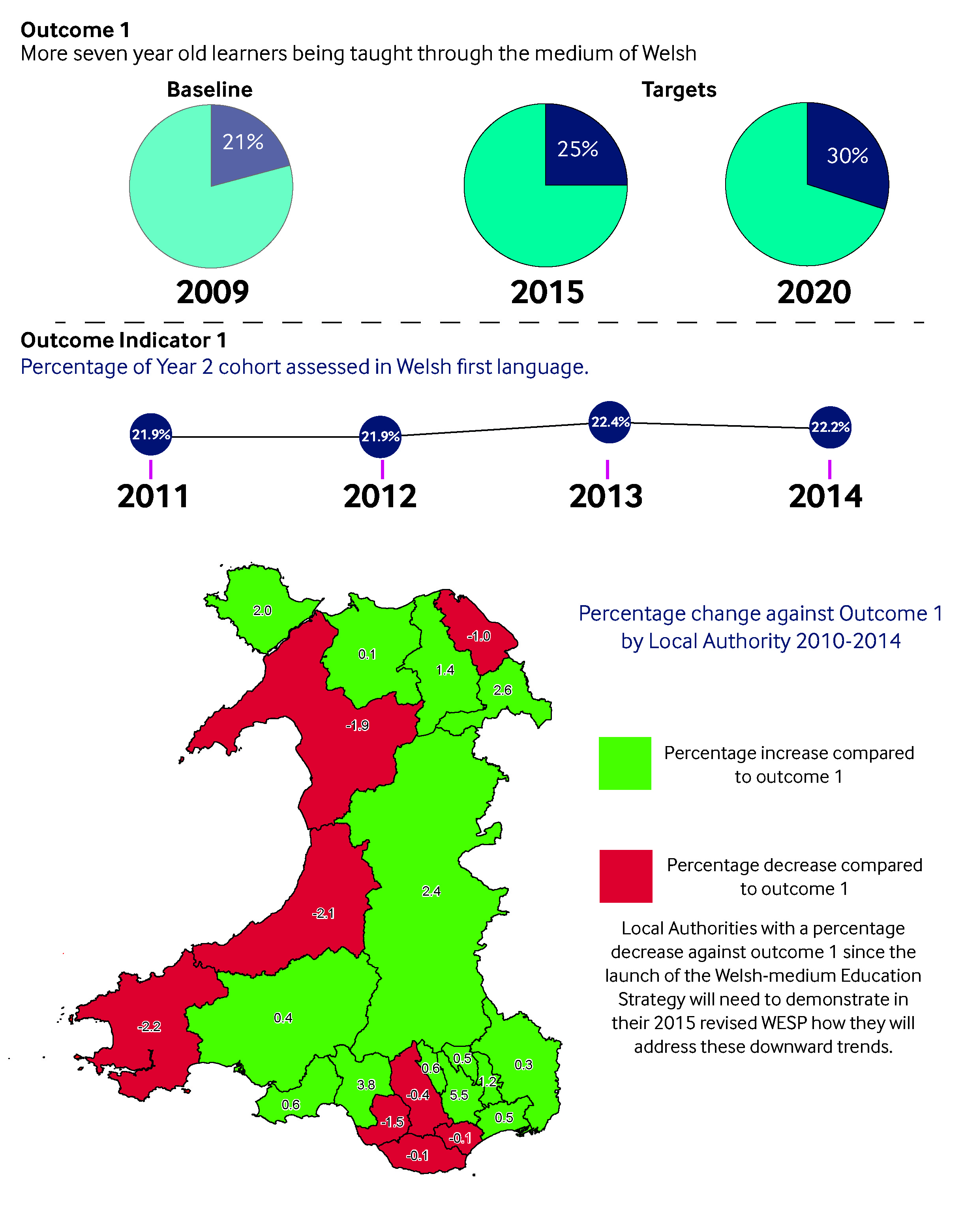Article by Sian Thomas, National Assembly for Wales Research Service
On Wednesday 24 February, Assembly Members will discuss how effective Welsh in Education Strategic Plans (WESPs) have been in supporting the Welsh Government’s local and national ambitions for Welsh-medium education. The debate in Plenary follows the publication of a report by the Children, Young People and Education Committee (PDF 1.53MB) in December 2015 and the Welsh Government’s response (PDF 293KB), published 17 February 2016. What are Welsh in Education Strategic Plans (WESPS)? The Welsh Government requires each local authority to produce a Welsh in Education Strategic Plan. WESPs are 3 year plans and are reviewed on an annual basis. WESPs are relatively new, becoming operational from April 2012, and subsequently put on a legal footing in the School Standards and Organisation (Wales) Act 2013. A WESP is required to set out:
- The local authority’s proposals on how it will improve the planning of the provision of Welsh-medium education in its area; the standards of Welsh medium education and the teaching of Welsh in its area;
- The local authority’s targets for improving the planning of the provision of Welsh-medium education in its area and for improving the standards of that education and of the teaching of Welsh in its area;
- Progress made to meet the targets contained in the previous plan or previous revised plan.
Integral to these plans is the local authority’s assessment of the demand for Welsh-medium education in its area, and what steps it will take to meet it. The Assembly’s scrutiny role is to examine the performance of the Welsh Government, rather than local authorities. The Children, Young People and Education Committee therefore looked specifically at the Welsh Government’s decision to require local authorities to produce and publish WESPs and whether this approach means that national ambitions and targets for Welsh-medium education are more likely to be delivered. What are the Welsh Government’s targets for Welsh-medium education? In April 2010, the Welsh Government published its Welsh-medium Education Strategy (WMES). This aims to:
- improve the planning of Welsh medium education at all ages
- plan for an appropriate workforce
- improve the central support mechanisms for Welsh-medium education and training
- contribute to the acquisition and reinforcement of Welsh-language skills in families and in the community.
The WMES strategy includes a number of national targets, used to monitor progress. In turn, local authorities set local targets in their WESPs and submit annual updates to the Welsh Government. Huw Lewis, Minister for Education and Skills outlined the link between WESPS and the Welsh-medium Education Strategy, telling the CYPE Committee: “The Strategy includes fixed five-year and indicative ten-year targets based on outcomes. Tangible progress against these targets would then be measured within a more effective, accountable and coherent planning system. Central to this planning system is the Welsh in Education Strategic Plan.” The Welsh Government's 2011 WESP guidelines set out a requirement that local authorities report on the following WMES targets:
- More seven-year-old children being taught through the medium of Welsh as a percentage of the Year 2 cohort
- More learners continuing to improve their language skills on transfer from primary school to secondary school
- More learners studying for qualifications through the medium of Welsh
- More learners aged 16-19 studying Welsh and subjects through the medium of Welsh
- More learners with improved skills in Welsh.
The guidelines also required local authorities to report progress on: standards of attainment in Welsh and Welsh Second Language; Welsh-medium provision for learners with additional learning needs; workforce planning and continuing professional development. The Welsh in Education Strategic Plans and assessing Demand for Welsh Medium Education (Wales) Regulations 2013 also sets out a list of matters which must be dealt with within a WESP. What exactly did the Children, Young People and Education Committee look into? The Committee considered:
- Whether WESPs are contributing to the outcomes and targets set out in the Welsh Government’s overarching Welsh Medium Education Strategy;
- Whether WESPs are (or have the potential) to deliver the required change at a local authority level (for example delivering provision to meet any increased demand for Welsh medium education);
- Arrangements for target setting; monitoring; reviewing; reporting; approving; and ensuring compliance with delivering the requirements for WESPs (and the role of the local authority and the Welsh Government in this regard);
- Whether WESPs evidence effective interaction between the Welsh Government’s Welsh-medium education strategy and other relevant policies and legislation (for example school transport policy; 21st Century Schools programme; A living language: a language for living – Moving forward policy statement; Flying Start; planning policy);
- Whether the outcomes of WESPs deliver equal outcomes for all pupils (for example primary/secondary pupils; children from low income households).
What did the Children, Young People and Education Committee find? Published in December 2015, the Committee’s report stated: “Welsh in Education Strategic Plans (WESPs) have the potential to deliver a significant increase in the numbers of children and young people being taught and studying for qualifications through the medium of Welsh. When WESPs were introduced, stakeholders saw this potential and welcomed them. However, many of those stakeholders are disappointed by the lack of impact WESPs have had in practice. For them, the story of WESPs so far is one of a missed opportunity. More worryingly, there are growing concerns they are not fit for purpose.” The Minister has recognised that not all the Welsh Government’s national targets would be delivered, telling the Committee: “We have already acknowledged in the last two Annual Reports on the Welsh-medium Education Strategy that we would be unlikely to meet all the 2015 targets. Against that background, it seems unlikely that those targets which will not be met in 2015 will also be met in 2020 without improved planning and action at local authority level.” An example of one of these targets is set out in the following infographic from the Committee’s report which sets out the targets for seven year olds being taught through the medium of Welsh alongside data on the percentage change by local authority between 2010-2014. [caption id="attachment_5694" align="alignnone" width="682"] Source: Welsh-medium Education Strategy Annual report 2014–15, Welsh Government[/caption] The Committee made 17 recommendations, including recommending that the ‘Welsh Government must ensure that WMES targets are reflected in WESPs and be more robust in its approval of WESPs to ensure they reflect the Welsh Government’s ambitions.’ The report also noted the ‘dual role local authorities have in both assessing [and meeting] the demand for Welsh-medium provision whilst also promoting its growth’ and that evidence suggested ‘there was a strong view that local authorities have struggled to fully grasp this dual role.’ The Committee went on to recommend that ‘the Welsh Government should be clearer with local authorities about its expectations in relation to the promotion of growth of Welsh-medium education so that all local authorities buy into the Welsh Government’s ambitions.’ What has been the Welsh Government’s response to the Committee’s 17 recommendations? In its response (PDF 293KB), the Welsh Government said: “Local authorities have had 3 years in which to develop and refine their WESPs but the extent to which Ministerial approval has required modifications suggests that there is still some way to go before they are sufficiently embedded in local authority processes to contribute more effectively to the targets and outcomes of the Welsh-medium Education Strategy.” “The Government views the introduction of WESPs as an important component in creating the system necessary to improve both the planning for, and standards of Welsh-medium education. Whilst this mechanism has been accepted by local authorities, it is too early to judge the impact of the Plans, especially as the initial approval of WESPs and, subsequently, the revised Plans has involved considerable modifications.” It accepted 6 recommendations, accepted a further 6 ‘in principle’ and rejected 5. You can watch the debate live on Senedd TV.
Source: Welsh-medium Education Strategy Annual report 2014–15, Welsh Government[/caption] The Committee made 17 recommendations, including recommending that the ‘Welsh Government must ensure that WMES targets are reflected in WESPs and be more robust in its approval of WESPs to ensure they reflect the Welsh Government’s ambitions.’ The report also noted the ‘dual role local authorities have in both assessing [and meeting] the demand for Welsh-medium provision whilst also promoting its growth’ and that evidence suggested ‘there was a strong view that local authorities have struggled to fully grasp this dual role.’ The Committee went on to recommend that ‘the Welsh Government should be clearer with local authorities about its expectations in relation to the promotion of growth of Welsh-medium education so that all local authorities buy into the Welsh Government’s ambitions.’ What has been the Welsh Government’s response to the Committee’s 17 recommendations? In its response (PDF 293KB), the Welsh Government said: “Local authorities have had 3 years in which to develop and refine their WESPs but the extent to which Ministerial approval has required modifications suggests that there is still some way to go before they are sufficiently embedded in local authority processes to contribute more effectively to the targets and outcomes of the Welsh-medium Education Strategy.” “The Government views the introduction of WESPs as an important component in creating the system necessary to improve both the planning for, and standards of Welsh-medium education. Whilst this mechanism has been accepted by local authorities, it is too early to judge the impact of the Plans, especially as the initial approval of WESPs and, subsequently, the revised Plans has involved considerable modifications.” It accepted 6 recommendations, accepted a further 6 ‘in principle’ and rejected 5. You can watch the debate live on Senedd TV.






